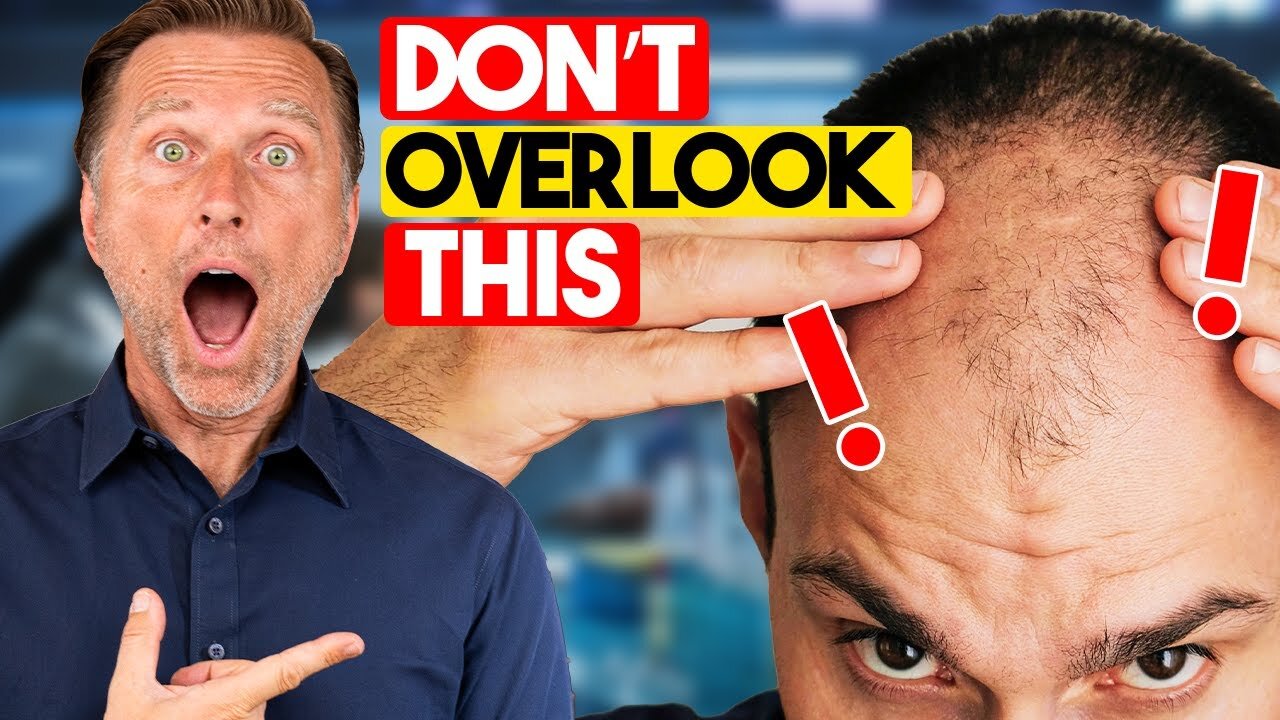Premium Only Content

The #1 Blood Test Most Overlooked for Hair Loss
you’re experiencing hair loss, thinning hair, or a loss of volume, this is for you! In this video, I’ll tell you about the best hair loss test to ensure you get the proper nutrients for hair growth and hair restoration.
0:00 Introduction: How to stop hair loss
0:15 The hair follicle
1:45 The best hair loss test
2:13 Vitamin D and hair loss
3:51 Vitamin D deficiency and alopecia
5:35 Magnesium and hair loss
8:09 Testing vitamin D levels
10:01 Vitamin D deficiency
10:37 A hair loss solution
12:20 Other nutrients that support hair regrowth
Video on Vitamin K2 and Calcium:
▶️ • Vitamin K2 and Pathological Calcifica...
Vitamin D is not a vitamin; it’s a hormone intimately involved in 10% of our genes. If you don’t have enough vitamin D, it can interfere with the genes responsible for hair growth. There is also a very high concentration of vitamin D receptors in the hair follicle.
Without enough vitamin D, your immune system is at risk of autoimmune conditions, including alopecia. Vitamin D supports the T cells that help combat autoimmune diseases. Psoriasis, dandruff, and dermatitis are also related to low vitamin D.
Magnesium is the most potent regulator of calcium and is involved with enzymes important for hair health. It’s also essential for the proper function of vitamin D.
There are 2 systems of vitamin D: one that controls calcium and one that has several functions, including hair growth and hair restoration. This form of vitamin D has a 24-hour half-life, so you need daily sun or supplements to prevent a hair loss problem.
There is a worldwide vitamin D deficiency epidemic! Several factors contribute to this massive vitamin D deficiency problem, including genetics, skin color, insulin resistance, diabetes, obesity, and air pollution.
Your blood vitamin D levels should be at least 70 to 100 ng/mL. You need at least 20,000 IU of vitamin D daily and 50 mg of magnesium to support hair growth. Zinc, iron, vitamin B12, and omega-3 fatty acids are also essential for hair restoration.
Key genes involved in hair growth:
1. Sonic Hedgehog (SHH) gene
2. WNT genes
3. BMP (Bone Morphogenetic Protein) genes
4. FGF (Fibroblast Growth Factor) genes
5. TGF-β (Transforming Growth Factor-Beta) genes
6. LEF1 (Lymphoid Enhancer-Binding Factor 1)
7. PDGF (Platelet-Derived Growth Factor)
8. Dkk (Dickkopf WNT Signaling Pathway Inhibitor) genes
9. CTNNB1 (Beta-Catenin)
Dr. Eric Berg DC Bio:
Dr. Berg, age 59, is a chiropractor who specializes in Healthy Ketosis & Intermittent Fasting. He is the author of the best-selling book The Healthy Keto Plan, and is the Director of Dr. Berg Nutritionals. He no longer practices, but focuses on health education through social media.
Follow Me On Social Media:
Facebook: https://bit.ly/FB-DrBerg
Instagram: https://bit.ly/IG-DrBerg
Listen to my Podcast: https://bit.ly/drberg-podcast
TikTok: https://bit.ly/TikTok-DrBerg
Disclaimer:
Dr. Eric Berg received his Doctor of Chiropractic degree from Palmer College of Chiropractic in 1988. His use of “doctor” or “Dr.” in relation to himself solely refers to that degree. Dr. Berg is a licensed chiropractor in Virginia, California, and Louisiana, but he no longer practices chiropractic in any state and does not see patients, so he can focus on educating people as a full-time activity, yet he maintains an active license. This video is for general informational purposes only. It should not be used to self-diagnose, and it is not a substitute for a medical exam, cure, treatment, diagnosis, prescription, or recommendation. It does not create a doctor-patient relationship between Dr. Berg and you. You should not make any change in your health regimen or diet before first consulting a physician and obtaining a medical exam, diagnosis, and recommendation. Always seek the advice of a physician or other qualified health provider with any questions you may have regarding a medical condition.
-
 22:01
22:01
DeVory Darkins
1 day ago $32.26 earnedHakeem Jeffries SHUTS DOWN The View as Matt Gaetz Speaks out
62.4K107 -
 2:02:54
2:02:54
Mally_Mouse
9 hours agoLet's Play!! - Spicy Saturday
44.2K1 -
 1:33:06
1:33:06
Slightly Offensive
9 hours ago $26.75 earnedAre You Ready for What's Coming Next? | Just Chatting Chill Stream
63.6K39 -
 32:10
32:10
MYLUNCHBREAK CHANNEL PAGE
1 day agoThe Gate of All Nations
138K60 -
 13:07
13:07
Sideserf Cake Studio
14 hours ago $3.45 earnedIS THIS THE MOST REALISTIC SUSHI CAKE EVER MADE?
56.6K4 -
 21:08
21:08
Clownfish TV
1 day agoElon Musk Tells WotC to BURN IN HELL for Erasing Gary Gygax from DnD!
44.9K15 -
 48:22
48:22
PMG
9 hours ago $10.11 earned"IRS Whistleblowers Speak Out on Biden Family with Mel K In-Studio"
37.2K24 -
 2:59
2:59
BIG NEM
11 hours agoLost in the Wrong Hood: Who Do I Check In With?
28.9K2 -
 1:29:32
1:29:32
I_Came_With_Fire_Podcast
22 hours ago"UFOs, Nukes, & Secrecy: Bob Salas on the 1967 Malmstrom Incident, UAPs, & Disclosure"
140K28 -
 1:57:05
1:57:05
The Quartering
15 hours agoElon Musk To BUY MSNBC & Give Joe Rogan A Spot, MrBeast Responds Finally To Allegations & Much More
133K109